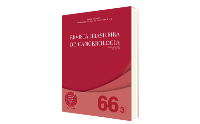The Impact of the Diagnosis on the Socioeconomic Conditions of the Families of Children and Adolescents with Solid Tumors
DOI:
https://doi.org/10.32635/2176-9745.RBC.2020v66n3.1104Keywords:
Neoplasms, Diagnosis, Social Conditions, Child, AdolescentAbstract
Introduction: Child and youth cancer is the disease that kills most children and adolescents in Brazil and the second leading cause of death in this age group. It is estimated that this type of cancer represents 1% to 4% of the incidence of all cancers in most populations, with approximately 80% of pediatric cancers occurring in low Human Development Index countries. Objective: Identify and reflect about the implications of the diagnosis on the socioeconomic conditions of the families of children and adolescents with solid tumors. It is attempted to understand the socioeconomic changes that occur in the lives of families and which social policies they look for during the pediatric oncologic treatment. Method: Quantitative, descriptive, prospective and longitudinal cohort study, , which addressed two moments with the parents/guardians of children and adolescents with solid tumors enrolled at National Cancer Institute José Alencar Gomes da Silva (INCA), from 8/1/2018 to 3/31/2019, with a sample of 55 participants. Results: One of the study findings shows that, after diagnostic confirmation, the family per capita income reduced, 63.6% of the participants trying to survive in extreme poverty with per capita income below ¼ of the minimum wage, compared with 25% (p-value<0.004) who survived in the same conditions at the time of admission. Conclusion: Therefore, it is understood that, even after three months of diagnostic confirmation, users do not access the assistance and social security benefits essential to ensure better conditions for the oncologic treatment.









